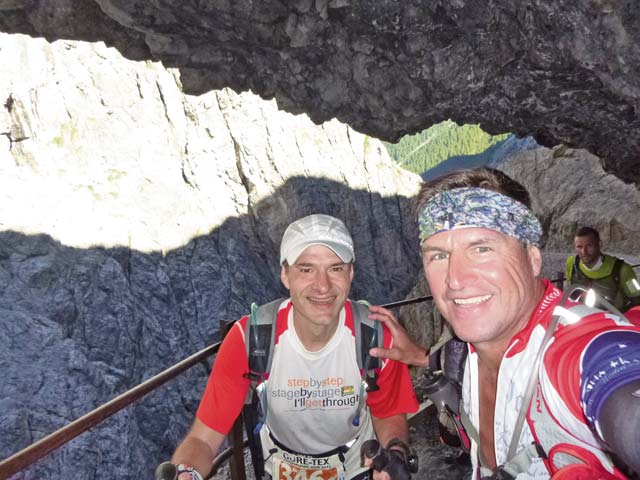
Marcelo Tordomar (left) and his teammate, Maj. James D. Eskelson, a member of the U.S. Army Reserve’s 7th Civil Support Command Headquarters, compete in the eight-day, 261.3 kilometer Transalpine-Run in Latsch, Italy.
Running full-speed at nosebleed elevations; traversing creeks, rocks and caves; scrambling over loose rock debris; and hiking up goat trails with walking sticks that resemble ski poles might seem crazy to some, but adventure racers — including one U.S. Army Reserve Soldier stationed in Europe — would race no other way.
Maj. James D. Eskelson, a member of the 21st Theater Sustainment Command’s 7th Civil Support Command and a native of Brigham City, Utah, and his teammate Marcelo Tordomar, a native of Buenos Aires, Argentina, completed the ninth annual Transalpine-Run Sept. 7 in Latsch, Italy.
The Transalpine-Run is an eight-day race that begins in Oberstdorf, Germany, travels through Austria and Switzerland, and ends in Latsch. It’s considered one of the most difficult races in the world. The race course traversed more than 160 miles, including a total of 51,982 feet in elevation changes. Competitors endured daily distances of 26 miles or greater — about the same distance as a marathon — as well as elevation changes that averaged 6,562 feet daily.
The race partners paired with each other after meeting online via a site for extreme sports fans. They competed against more than 700 other racers, some with corporate sponsorships, even though they had not met face-to-face until the day before the race. The 366 competing teams came from more than 30 countries and vied for prizes and accolades in multiple categories for males and females, Eskelson said.
“Our goal was to enjoy the entire experience, meet new friends and be official finishers,” Tordomar said.
During the race, Eskelson and Tordomar pushed their bodies to compete in the race. In addition to physical injuries, both teammates battled the effects of running at high altitudes.
“Marcelo injured his Achilles tendon on the first day, which worsened during the race,” Eskelson said. “Tordomar also developed a huge, 50 cent coin-sized blister.”
Strict guidelines for recognition as an official “finisher” added additional stress to the duo.
“In order to qualify as having officially completed the grueling eight-day event, competitors were required to meet all the mandatory times at the checkpoints along the route during each stage,” Eskelson said. “If you miss one, you are not officially ranked, nor does the team receive recognition for competing.”
Eskelson combated the difficult conditions, his partner’s injury and his own fatigue by using skills he attributes to the Army.
“To keep Marcelo in the game I had to rely on multiple facets of my military training, like leadership, teamwork and combat lifesaving skills,” Eskelson said. “As physically difficult as this race was, it was equally tough mentally for me to keep my focus on maintaining Marcelo’s mindset so he remained positive each day that our goal was to finish together. Moreover, I utilized my combat lifesaving skills daily on his injuries and came up with some rather creative techniques for covering and bracing his right foot and blister.”
Both teammates ran between 30 and 60 miles a week to prepare for the race and competed in multiple, smaller competitions in the months leading up to the race. Even with all the preparation, Eskelson found the race challenging and lost eight pounds during the event. Although it was difficult, he believes it was well worth it, he said.
“Overall, this was an awesome, once-in-a-lifetime running event and, to me, the only way to really see the European Alps,” Eskelson said.


